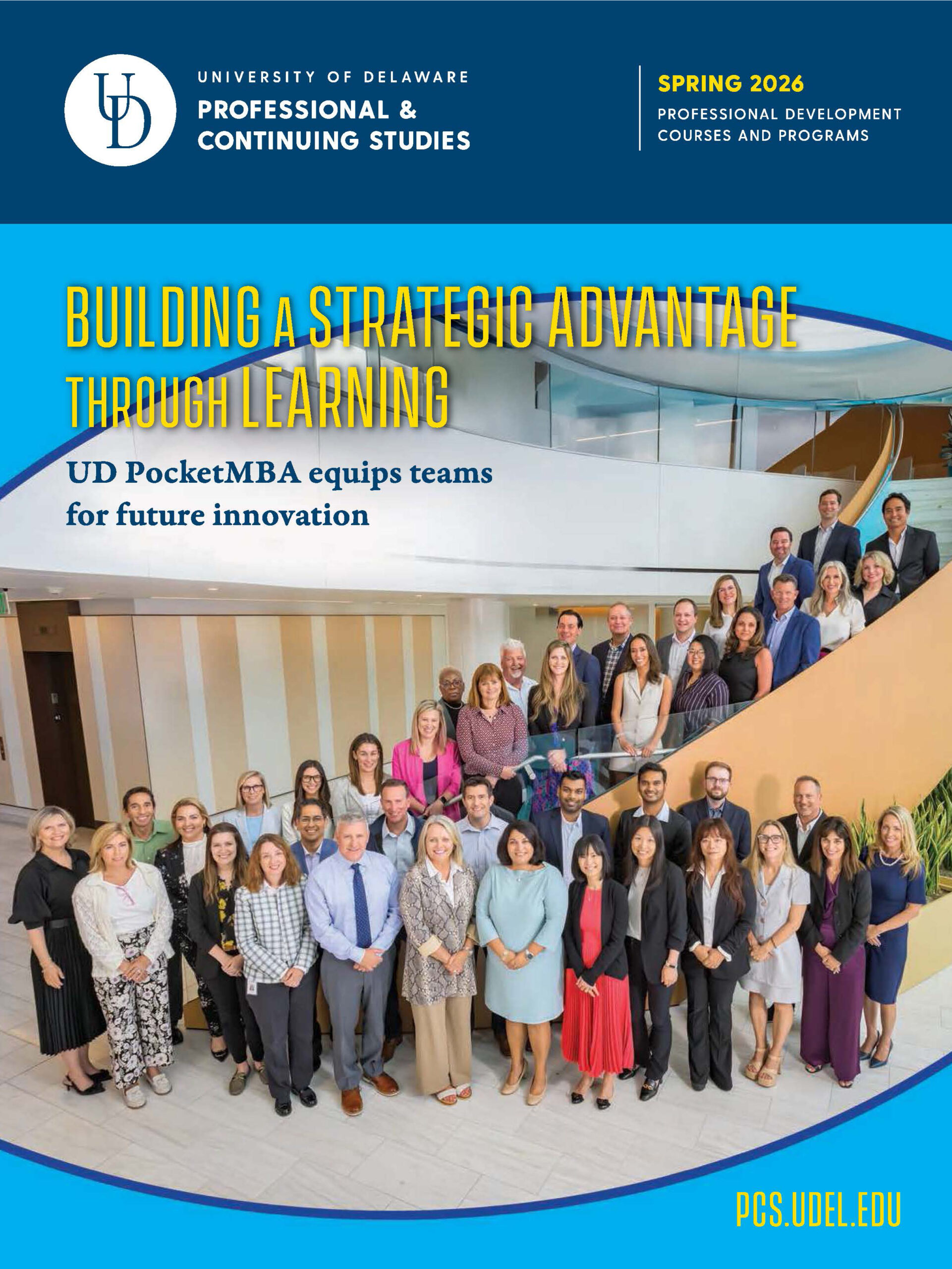Enhance your project management toolbox
 Introductory- and intermediate-level courses
Introductory- and intermediate-level courses- Participate in online classes anywhere, anytime
- Discounts available
- For more information
These days, project management is multidimensional depending on the project, industry and team. Our Agile program of coursework teaches the principles of Agile project management, an iterative, skinnied-down approach to project management for teams that must move quickly. Add this approach to your project management toolbox to be even more marketable to businesses and valued within your organization.
Courses
- Challenges for Agile Teams
- Integrating Agile Into a Waterfall Environment
- Introduction to Agile
- Principles of Scrum
![]() Challenges for Agile Teams
Challenges for Agile Teams
LOCATION: Online
ESTIMATED LENGTH: 5 hours
ACCESS TIME: 90 days
PRICE: $179, all materials included. Potential discounts available, including: Military, UD student or alum, 2 or more (group).
0.5 CEUs | 5 PDUs
This intermediate-level course is designed to help Agile practitioners decipher and solve the problems that arise regularly in their work. The class begins with 16 video segments from seasoned Agile trainers and practitioners providing tips and best practices for addressing Agile team challenges. Next, 20 short case studies that test the student’s understanding of Agile practices and provide guidance for resolving common problems are presented. The case studies are structured to simulate the conversations and interactions that happen regularly on Agile projects; seeing these disputes as narratives will help students learn to deconstruct issues and diagnose the underlying problems that need to be corrected, just as they would in their everyday work. As students decode these disputes and plan appropriate responses, they will gain the experience needed to guide their teams and put them back on track to deliver value to their customers.
LEARNER OUTCOMES
- Identify the underlying issues that lead to common problems for Agile teams.
- Help team members recognize when their behaviors are inhibiting team development.
- Describe ways to keep an Agile team focused on delivering value.
- Uncover additional stakeholders and project participants to enhance project feedback.
- Give examples of the “must have” skills that product owners should possess.
- Reorganize daily stand-ups to improve their performance.
- Summarize options for overcoming velocity estimation mistakes.
- Outline effective rewards and acknowledgments that promote team cohesion and interaction.
NOTES
- This course has an “Ask the Expert” feature, which submits your questions directly to an expert in the field you are studying. Questions are answered as quickly as possible and usually within 24 hours.
- Learners must achieve an average test score of at least 70% to meet the minimum successful completion requirement and qualify to receive International Association of Continuing Education and Training (IACET) CEUs. Learners will have three attempts at all graded assessments.
![]() Integrating Agile Into a Waterfall Environment
Integrating Agile Into a Waterfall Environment
LOCATION: Online
ESTIMATED LENGTH: 4 hours
ACCESS TIME: 90 days
PRICE: $125, all materials included. Potential discounts available, including: Military, UD student or alum, 2 or more (group).
0.4 CEUs | 4 PDUs
This intermediate-level course is designed to help Agile practitioners recognize and resolve many of the common issues that emerge when Agile concepts are introduced into Waterfall organizations. The course begins with 24 video segments from seasoned Agile trainers and practitioners providing tips and best practices for addressing integration obstacles. Next, 20 short case studies simulating the communication and interchanges that can occur as Agile and Waterfall practitioners work to resolve differences in the ways that they see and execute tasks are presented As students evaluate these case studies, they’ll learn to deconstruct and diagnose any underlying problems that need to be resolved, just as they would in everyday practice. While they work to decode and correct these issues, they will begin to recognize the common pitfalls that can happen as project teams collaborate and interact, which will allow them to step in to solve potential problems before work is affected.
LEARNER OUTCOMES
- Identify whether Agile concepts and methodologies could be integrated into an existing organization.
- Describe tools and techniques that could assist in Agile integration.
- Recognize the problems that Agile and Waterfall collaborators contend with on a regular basis.
- Apply practical tips from experienced practitioners to correct these problems.
- Recognize the advantage of “failing fast.”
- Uncover impediments or obstacles that may occur when running Agile and Waterfall in parallel.
- Examine several project artifacts that can be used to show progress during transitional states.
- Identify the essential elements of an integration framework.
- Discuss ways to temper expectations as integration takes hold.
NOTES
- This course has an “Ask the Expert” feature, which submits your questions directly to an expert in the field you are studying. Questions are answered as quickly as possible and usually within 24 hours.
- Learners must achieve an average test score of at least 70% to meet the minimum successful completion requirement and qualify to receive International Association of Continuing Education and Training (IACET) CEUs. Learners will have three attempts at all graded assessments.
![]() Introduction to Agile
Introduction to Agile
LOCATION: Online
ESTIMATED LENGTH: 10 hours
ACCESS TIME: 180 days
PRICE: $299, all materials included. Potential discounts available, including: Military, UD student or alum, 2 or more (group).
1 CEU | 10 PDUs
This introductory-level course explores the methodologies and practices of Agile development and explains the key concepts and principles that form the foundation of Agile project management. This self-paced course contains vocabulary games, flashcards and interactive exercises to supplement and enhance your understanding of Agile concepts, as well as video segments from Agile experts to help you become a more proficient Agile practitioner.
LEARNER OUTCOMES
- Define Agile development and differentiate it from traditional Waterfall practices.
- Identify the similarities and differences among several Agile methodologies.
- Describe the stages of the Agile development cycle and identify the factors that promote project success.
- Understand the nuances of leading and working with Agile teams.
- Apply best practices from organizations that have successfully incorporated Agile methodologies into their business activities.
NOTES
- This course has an “Ask the Expert” feature, which submits your questions directly to an expert in the field you are studying. Questions are answered as quickly as possible and usually within 24 hours.
- Learners must achieve an average test score of at least 70% to meet the minimum successful completion requirement and qualify to receive International Association of Continuing Education and Training (IACET) CEUs. Learners will have three attempts at all graded assessments.
![]() Principles of Scrum
Principles of Scrum
LOCATION: Online
ESTIMATED LENGTH: 25 hours
ACCESS TIME: 180 days
PRICE: $349, all materials included. Potential discounts available, including: Military, UD student or alum, 2 or more (group).
1 CEU | 10 PDUs
This course outlines the fundamental theories and principles of Scrum frameworks, including the underlying philosophy and essential tools practitioners need to adapt to an Agile way of working. Implemented properly, these techniques can produce extraordinary results for stakeholders and customers. Information in this course is presented in a simple, easy-to-understand format and augmented by interactive games and exercises to improve learner understanding and retention. Case studies and video segments from experienced Scrum professionals provide real-world tips and guidance to bolster learner comprehension and expand knowledge at practical and applicable levels.
LEARNER OUTCOMES
- Define essential Scrum terms and identify the interdependent nature of key concepts.
- Summarize the specific, distinct roles that practitioners assume in effective Scrum frameworks.
- Identify the stages of the Scrum cycle and demonstrate how these stages combine to meet evolving customer needs and requirements.
- Compare and contrast the three primary Scrum artifacts and detail how they integrate to ensure a common understanding of project expectations.
- Explore several tools and techniques that help project participants meet and exceed customer needs and wants.
NOTES
- This course has an “Ask the Expert” feature, which submits your questions directly to an expert in the field you are studying. Questions are answered as quickly as possible and usually within 24 hours.
- Learners must achieve an average test score of at least 70% to meet the minimum successful completion requirement and qualify to receive International Association of Continuing Education and Training (IACET) CEUs. Learners will have three attempts at all graded assessments.



